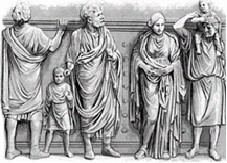 Part
4 A Father’s offer
Part
4 A Father’s offer Part
4 A Father’s offer
Part
4 A Father’s offer
“Augustus was sensible that mankind is governed by names; nor was he deceived in his expectation, that the senate and people would submit to slavery, provided they were respectfully assured that they still enjoyed their ancient freedom.”1 He suggested a series of changes that drove a stake through the heart of the last vestiges of the Roman Free Republic. While always proclaiming a desire and intention to reform the way to safety, prosperity, and freedom, he edged inexorably toward tyranny.
This road to ruin began a glorious journey of successive rulers who consistently grew in power. By the rule of Marcus Aurelius, true freedom and independence was despised. This stoic president led what historians have called the Golden Age of Rome.
If you wish to conquer a people, addict their hearts to the love of benefits and their minds to vain knowledge, then they will fight to maintain their slavery against any who might set them free. Just teach the people to call good “evil” and evil “good”. The weakened and deceived people of a once strong republic will rush to grant new power to men like Augustus in exchange for peace and security. With the abandonment of responsibility, liberty, and freedom, rights are soon traded for the provisos, or conditions, and the “provisions of the state”.
For when they speak great swelling words of vanity, they allure through the lusts of the flesh, through much wantonness, those that were clean escaped from them who live in error. While they promise them liberty, they themselves are the servants of corruption: for of whom a man is overcome, of the same is he brought in bondage. 2 Peter 2:19
With the office of Emperator, translated “Commander-in-Chief”, he controlled the military. With the office of Principas Civitas, “First Citizen”, he was the chief executive officer, President of Rome, Prince of the People, signing into law the statutes of the Senate. And with the office of Apo Theos, ”Appointor of gods”, he appointed the magistrates and judges throughout the Empire to enforce those laws and his sovereign power.
It was not these three elected offices of Roman government that subdued the people so much as the clever systems of citizen enfranchisement.2 Among these was the threefold process of individual abdication through Novation,3 Tutor4 and Korban5.
The fathers and patriarchs of each household steadily released their custodial rights to their sons and daughters into the power of the of the State, the Conscripted Fathers.6 Originally within the laws of Nature and Nature's God, it is the Father of a house who holds the power and authority over his children. Originally, children were the property of the head of the household. The Romans called this authority and right patria potestas.
“The patria potestas could not be dissolved immediately by manumissio (manumission), because the patria potestas must be viewed as an imperium, and not as a right of property like the power of a master over his slave.”7
What Caesar had become through a history of changes was the Pater Patriae, “The Father of his Country”. With this granted imperium, the heads of the families, the fathers, were cut off from their God-given rights, liberty, and freedom. The Commander-in-Chief was proclaimed to be the Patron of the people of Greater Rome, called the “world”. To this new world order, he was the Patronus, or Our Father, to whom all were to apply for security and salvation.
The registration of foreigners, as well as resident citizens, led to the registrations of the children of each family in a process of Novation, whereby a father manumitted the custody of his own children into the care and tutorship of the Father of the state. This custom alone would eventually bring Rome and the Kingdom of God into pernicious conflict.
The Caesars, as Father of the State, initiated a series of reforms that began a fast track ascension into the bondage that had begun years before. But “It is easier to show the disorder that must accompany reform than the order that should follow it.”8 By 200 AD, Caesar was the name of a subordinate to the Emperor, which was called Augustus in Latin or Basileus in Greek.
Caesar Augustus was not alone in his lust for power and control. His rise to authority over men was relatively easy. All he had to do was to appeal to the tyranny in the hearts of every man. By promising them an entitlement to the power and profits of his rule, his own jurisdiction was insured. Men feared standing for what was right, they coveted their neighbor's goods and they loved themselves more than they loved their neighbor or their rights. Freedom soon perishes in a nation of tyrants.
1Chapter 3 Gibbon’s Decline and Fall of the Roman Empire
2Enfranchisement n. 1. Releasing from slavery or custody. 2. Admission to the freedom of a corporation or body politic; investiture with the privileges of free citizens. Webster’s Dictionary
3“the remodeling of an old obligation.” Webster’s Dictionary
4tutor -ari, dep.: also tuto -are: to protect, watch, keep. guard against.
5Bringing closer to the originator or father, a substitute father honored.
6Conscripti Patres. Elected Fathers of the Senate. All Senators were addressed Patri or Father.
7Unterholzner, Zeitschrift, vol. ii p. 139; Von den formen der Manumissio per Vindictam und der Emancipatio.
8Frederic Bastiat